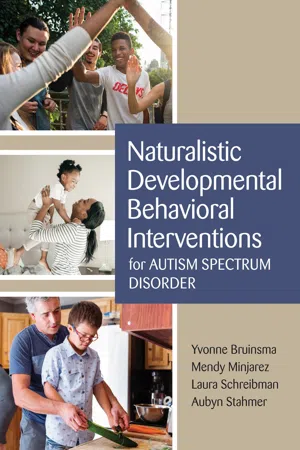
Naturalistic Developmental Behavioral Interventions for Autism Spectrum Disorder
- 464 pages
- English
- ePUB (mobile friendly)
- Available on iOS & Android
Naturalistic Developmental Behavioral Interventions for Autism Spectrum Disorder
About this book
Rooted in both ABA and developmental theory, Naturalistic Developmental Behavioral Interventions (NDBI) are some of today's most effective, evidence-based, and widely used interventions for autism spectrum disorder. Prepare tomorrow's autism professionals for success in the field with this graduate-level textbook, the first comprehensive introduction to the principles and practices of NDBI.
Future professionals will start with a clear and detailed overview of NDBI, examining how these approaches use natural environments and personal interests to motivate the child and bring about lasting improvements in skills and behavior. Then they'll explore the foundational principles of NDBI, take an in-depth look at the most successful NDBI models, and learn how to use specific NDBI strategies to improve child outcomes.
Prepare future professionals to:
- Identify quality indicators of NDBI programs
- Understand how proven NDBI models, including Pivotal Response Treatment, Early Start Denver, Enhanced Milieu Teaching, and Project ImPACT fit in the NDBI framework
- Select meaningful skills to teach children within their natural environment
- Write measurable and attainable goals across developmental domains
- Empower parents to use NDBI strategies during everyday interactions with their children
- Use NDBI strategies to support children in inclusive environments
- Enhance children's communication skills, social competence, and play skills
- Support positive behavior and self-regulation using an NDBI framework
- Work NDBI strategies into school-based activities and lessons
COMPANION MATERIALS: Enhance your instruction with downloadable versions of the datasheets and other forms, sample syllabi to help you integrate this book into your course, PowerPoint decks that summarize key takeaways from the chapters to guide lectures, and a 158-question multiple-choice test bank to help you build course assessments and quizzes.
Frequently asked questions
- Essential is ideal for learners and professionals who enjoy exploring a wide range of subjects. Access the Essential Library with 800,000+ trusted titles and best-sellers across business, personal growth, and the humanities. Includes unlimited reading time and Standard Read Aloud voice.
- Complete: Perfect for advanced learners and researchers needing full, unrestricted access. Unlock 1.4M+ books across hundreds of subjects, including academic and specialized titles. The Complete Plan also includes advanced features like Premium Read Aloud and Research Assistant.
Please note we cannot support devices running on iOS 13 and Android 7 or earlier. Learn more about using the app.
Information
Table of contents
- Cover
- Title Page
- Copyright
- Contents
- About the Editors
- About the Contributors
- Foreword
- Acknowledgments
- About the Online Materials
- Section I: Overview
- Chapter 1: Understanding NDBI
- Chapter 2: Considering NDBI Models
- Section II: Core Concepts and Foundational Principles
- Chapter 3: Selecting Meaningful Skills for Teaching in the Natural Environment
- Chapter 4: Empowering Parents Through Parent Training and Coaching
- Chapter 5: Fostering Inclusion With Peers and in the Community
- Section III: NDBI Strategies
- Chapter 6: Implementing Motivational Strategies
- Chapter 7: Applying Antecedent Strategies
- Chapter 8: Implementing Instructional Cues and Prompting Strategies
- Chapter 9: Using Consequence Strategies
- Chapter 10: Guiding Meaningful Goal Development
- Section IV: Applications of NDBI Strategies
- Chapter 11: Targeting Communication Skills
- Chapter 12: Improving Social Skills and Play
- Chapter 13: Supporting Behavior, Self-Regulation, and Adaptive Skills
- Chapter 14: Implementing NDBI in Schools
- Chapter 15: Collecting Data in NDBI
- Chapter 16: Identifying Quality Indicators of NDBI Programs
- Chapter 17: Considering Future Directions in NDBI
- Glossary
- Index